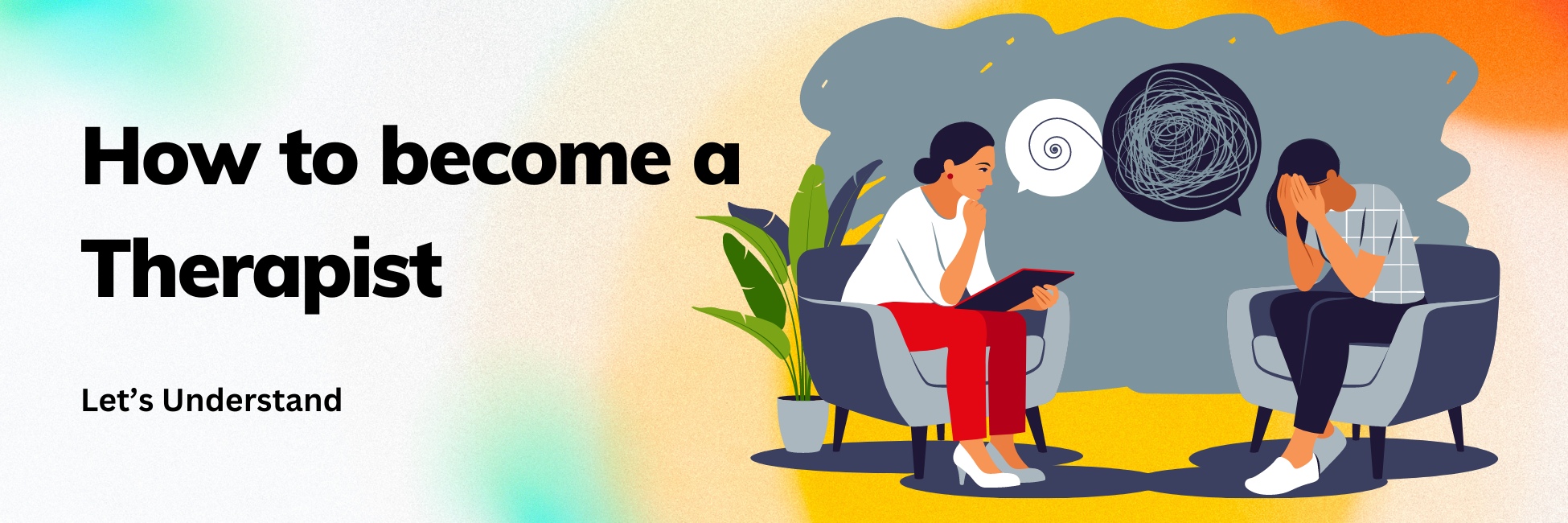Change Lives, Start Here: Your Path to Becoming a Therapist.

How to become a Therapist
Many people in the United States face mental health challenges, according to data from the National Alliance of Mental Illness. As a result, the need for therapist to provide counseling services is increasing. According to the Bureau of Labor Statistics (BLS), there is an expected increase of 16 percent in the employment of marriage and family therapists by the year 2030.
Thankfully, there are numerous online therapy and counseling degree programs available to help meet this growing demand. These programs offer opportunities to specialize in areas such as addiction, child therapy, and gerontology.
In the upcoming sections, we’ll discuss the differences between therapists, counselors, and psychologists, outline the steps to becoming a licensed therapist, and explore various career paths within the field.
Navigating the Mental Health Professions: Therapists, Counselors, and Psychologists
While the terms “therapist” and “counselor” are often used interchangeably, there are key distinctions between these mental health professionals. Both therapists and counselors provide support for a variety of concerns, including relationship issues, anxiety, ADHD, and substance abuse. They achieve licensure through specific education, passing required exams, and gaining practical experience.
Psychologists, on the other hand, delve deeper into the science of the mind, exploring the link between brain function and behavior. They assist individuals navigating significant life events like loss or chronic health conditions. To become a licensed psychologist, a master’s or doctoral degree in psychology is typically required, along with passing exams like the EPPP, supervised internships, and postdoctoral experience.
Whether your interest lies in therapy, counseling, or psychology, numerous online degree programs can equip you with the necessary qualifications. These programs provide a flexible path towards a fulfilling career dedicated to enhancing mental health and well-being.

Becoming a Licensed Therapist or Counsellor
To become a licensed therapist or counselor nationwide, you’ll need to complete certain educational and professional requirements. Firstly, you must earn a graduate-level degree from a counseling program accredited by the Council for Accreditation of Counseling and Related Educational Programs (CACREP) and the American Psychological Association. Additionally, most states mandate the completion of supervised clinical experience after obtaining your degree.
Individuals interested in pursuing a therapist license must also pass a state-approved counseling examination. These exams, such as the National Counselor Examination, evaluate your readiness to practice as a professional counselor.
The journey begins with obtaining a bachelor’s degree, typically in fields like psychology, sociology, or social work, which lays the groundwork for further studies. Following this, you’ll pursue a master’s degree from an accredited program. Many states require adherence to CACREP guidelines, ensuring the program’s quality and relevance to counseling practice.
After completing your degree, you’ll need to fulfill post-graduate experience requirements. This involves accumulating supervised counseling hours, usually between 2,000 and 3,000 hours, under the guidance of licensed professionals. It’s crucial to ensure these hours are dedicated to direct client care and face-to-face interaction.
Once you’ve met the experience criteria, you’ll need to pass your state’s licensure exam. The National Counselor Examination is a common option, administered by the National Board for Certified Counselors. Each state has its own licensing board directory, providing information on exam registration and requirements.
By following these steps diligently, aspiring therapists can meet the necessary qualifications and pursue a fulfilling career in mental health counseling across the United States.
Jurisprudence Exams: A Requirement for Aspiring Counselors
In many states, aspiring counselors must pass a jurisprudence exam as a condition of licensure. This exam assesses an individual’s understanding of the laws and regulations that govern counseling practice within that specific jurisdiction.
The Purpose of Jurisprudence Exams
Jurisprudence exams serve a significant purpose. They ensure that counselors possess a foundational knowledge of the legal framework that guides their profession. This knowledge is essential for:
- Ethical Practice: By understanding relevant laws and ethical codes, counselors can provide services that adhere to the highest professional standards.
- Client Protection: Knowledge of client rights and confidentiality laws empowers counselors to effectively advocate for their clients’ well-being.
- Reduced Legal Risk: Familiarity with licensing board regulations helps counselors minimize the risk of legal issues arising in their practice.
Content of Jurisprudence Exams
While the specific content may vary slightly by state, jurisprudence exams typically focus on key areas:
- Licensing Board Rules: This includes knowledge of the application process, renewal requirements, continuing education mandates, and the ethical code established by the state’s licensing board.
- Applicable Laws: Laws related to privacy, confidentiality, mandated reporting, and other areas relevant to counseling practice are typically covered.
- Scope of Practice: The exam may assess your comprehension of the activities and interventions that fall within the legal boundaries of counselor practice in that state.
Preparing for the Jurisprudence Exam
Many states offer resources and study materials to aid aspiring counselors in preparing for the jurisprudence exam. By dedicating time to studying, individuals can confidently demonstrate their legal knowledge and embark on their counseling careers with a strong foundation.
Conclusion
Passing a jurisprudence exam is an essential step for aspiring counselors. It demonstrates a commitment to understanding the legal and ethical framework that guides their profession. This knowledge is crucial for providing competent and ethical care to clients.

Different Kinds of Therapists
The field of mental health offers many specialized careers. Each career focuses on helping people with specific challenges in their daily lives. This section explores what it takes to become different types of mental health professionals. These include psychotherapists, marriage and family therapists, and specialists like applied behavior analysts, recreational therapists, child therapists, cognitive behavioral therapists, addiction counselors, career counselors, gerontological counselors, and school counselors.
- Psychotherapist: These professionals assist individuals with a broad spectrum of challenges affecting their daily lives, including depression, anxiety, loss, illness, substance abuse, and relationship difficulties. Utilizing techniques like cognitive-behavioral therapy and talk therapy, psychotherapists empower clients to develop coping mechanisms and achieve greater well-being and productivity.
Steps to Becoming a Psychotherapist
The path to becoming a psychotherapist typically involves the following steps:
- Earn a Bachelor’s Degree: Complete a bachelor’s degree program from an accredited college or university.
- Master’s Degree in Psychology or Psychotherapy: Pursue a Master of Arts (MA) or Master of Science (MS) degree in psychology or psychotherapy from an accredited institution.
- Doctoral Degree (Optional): Consider obtaining a Doctor of Philosophy (Ph.D.) or Doctor of Psychology (Psy.D.) degree from an accredited doctoral program for advanced research and specialization (optional).
- Supervised Clinical Experience: Accumulate the specific number of supervised counseling hours mandated by your state licensing board.
- Pass Licensure Exam: Achieve a passing score on the National Counselor Examination (NCE) or an equivalent licensure exam required by your state. Contact your state’s licensing board for details on exam registration.
- Continuing Education: Maintain your license by fulfilling continuing education requirements through university courses, seminars, workshops, independent study, publications, or presentations.
Marriage and Family Therapist
Function:
- Assist couples and families facing relationship difficulties.
- Provide comprehensive mental health care, considering family dynamics.
- Practice in various settings, including mental health centers, community agencies, and private practices.
Mental Health Professionals: Applied Behavior Analysis (ABA) Therapist
Function:
- Observe client behavior to understand habits and motivations.
- Conduct assessments in natural environments to guide intervention strategies.
- Often work with individuals with autism spectrum disorder, traumatic brain injuries, and other developmental delays or disorders.
Recreational Therapist
Function:
- Implement leisure activities to improve mental and physical well-being, and facilitate recovery for clients with illnesses or disabilities.
- Employ various activities, including arts and crafts, interaction with animals, dance, drama, and organized outings, to support client well-being.
Steps to Become One:
- Bachelor’s Degree: Earn a bachelor’s degree in recreational therapy or a relevant field from an accredited college or university.
- Certification: Earn Certified Therapeutic Recreation Specialist (CTRS) certification by passing a knowledge-based exam administered by the National Council for Therapeutic Recreation Certification (NCTRC).
Child Therapist
Function:
- Support children and adolescents facing challenges at home and school, such as bullying, family issues, depression, trauma, eating disorders, and anxiety.
- Help children and adolescents improve communication, learning, and develop coping mechanisms.
Cognitive Behavioral Therapist (CBT)
Function:
- Utilize goal-oriented treatment to provide practical steps for clients to achieve specific goals, such as overcoming sleep problems, anxiety, relationship issues, or addiction.
- Employ therapy that focuses on shifting negative thought patterns and adjusting behaviors to manage emotional challenges.
Addiction Counselor
Function:
- Support individuals and families struggling with substance abuse and other addictive behaviors.
- Work in various settings including education, prevention programs, and intervention services.
Additional Information:
Addiction counselors may also benefit from obtaining certification from a recognized organization in the field of addiction counseling. This demonstrates advanced knowledge and specialization.
Career Counselor
Function:
- Provide expertise in career development across various life stages.
- Work in diverse settings like K-12 schools, colleges and universities, or private practice.
- Assist clients with navigating work-related issues, unemployment, and skill development.
Gerontological Counselor
Function:
- Provide support on issues related to aging, communication skills, and mental health for older adults.
Specialty:
- Gerontological counseling falls under the broader field of gerontology, dedicated to addressing the needs of elderly populations.
Steps to Become One:
(Note: The steps to become a gerontological counselor may vary depending on your state. It’s recommended to consult your state’s licensing board for specific requirements.)
School Counselor
Function:
Support students in elementary, middle, and high schools in their academic journey, social interactions, and emotional well-being.
Guide students to reach their full potential as learners.
FAQ
1.How many years does it take to become a therapist?
Time Required to Become a Therapist
The time it takes to become a therapist can vary depending on several factors, including:
- Degree Level: Master’s degrees typically take 18 months to 3 years to complete, while doctoral programs (PsyD or Ph.D.) can take 4 to 7 years.
- Program Type: Full-time programs allow you to complete the coursework faster than part-time programs.
- Area of Specialization: Certain specializations may require additional coursework or training.
- Transfer Credits: Existing credits from previous studies can reduce the overall program length.
In addition to completing your degree, you’ll need to fulfill supervised clinical experience requirements mandated by your state licensing board. This typically takes one to two years. You’ll also need to pass a licensing exam.
Overall, the total time to become a therapist can range from approximately four to ten years.
2.How do I become a private practice therapist?
Steps to Become a Private Practice Therapist
The journey to becoming a private practice therapist involves several key steps:
- Earn a Bachelor’s Degree: Begin with a bachelor’s degree in psychology or a related field that interests you.
- Master’s Degree in Counseling: Pursue a master’s degree specifically in counseling. Consider specializing in a type of therapy you’d like to practice later.
- Supervised Clinical Experience: Following your master’s degree, accumulate the required supervised clinical experience hours mandated by your state licensing board. This typically ranges between 2,000 and 3,000 hours.
- Pass Licensure Exam: Successfully pass a comprehensive licensing exam, such as the National Counselor Examination (NCE) or an equivalent exam required by your state.
- Business Considerations: Once licensed, explore the business aspects of running a private practice. This may involve tasks like finding office space, obtaining business permits, and determining insurance participation.
By following these steps and fulfilling any additional state-specific requirements, you can establish yourself as a private practice therapist and provide mental health services directly to clients.
3.How much does a therapist make?
Factors Influencing Compensation
The compensation for therapists varies depending on several key factors:
- Geographic Location: Therapists in certain regions or states may receive higher salaries compared to others.
- Work Environment: Therapists employed in private practice may have different earning structures compared to those working for hospitals, government agencies, or mental health centers.
- Experience Level: Therapists with extensive experience typically earn more than those who are new to the field.
Salary Information and Trends
Data from the Bureau of Labor Statistics (BLS) indicates that the median annual salary for substance abuse, behavioral disorder, and mental health therapists in 2021 was $48,520. However, the salary range can be much wider, with top earners exceeding $77,980.
Work Settings and Potential Earnings
The BLS also identifies the following industries as top payers for mental health therapists:
- Government agencies
- Hospitals
- Individual and family services
- Outpatient mental health centers
- Residential mental health and substance abuse facilities
- Salary Comparison Websites: Several websites offer salary comparison tools specifically for mental health professionals. These sites may compile data from job postings, surveys, and other sources to provide more current salary information. Some reputable options include:
- Glassdoor (https://www.glassdoor.com/index.htm)
- Indeed (https://www.indeed.com/)
- Salary.com (https://www.salary.com/)
- Professional Associations: National professional associations for therapists may conduct salary surveys among their members. These surveys can provide valuable insights into therapist salaries within specific specialties or geographic regions. Here are some associations to explore:
- American Psychological Association (APA): https://www.apa.org/
- American Counseling Association (ACA): https://www.counseling.org/
- National Board for Certified Counselors (NBCC): https://www.nbcc.org/